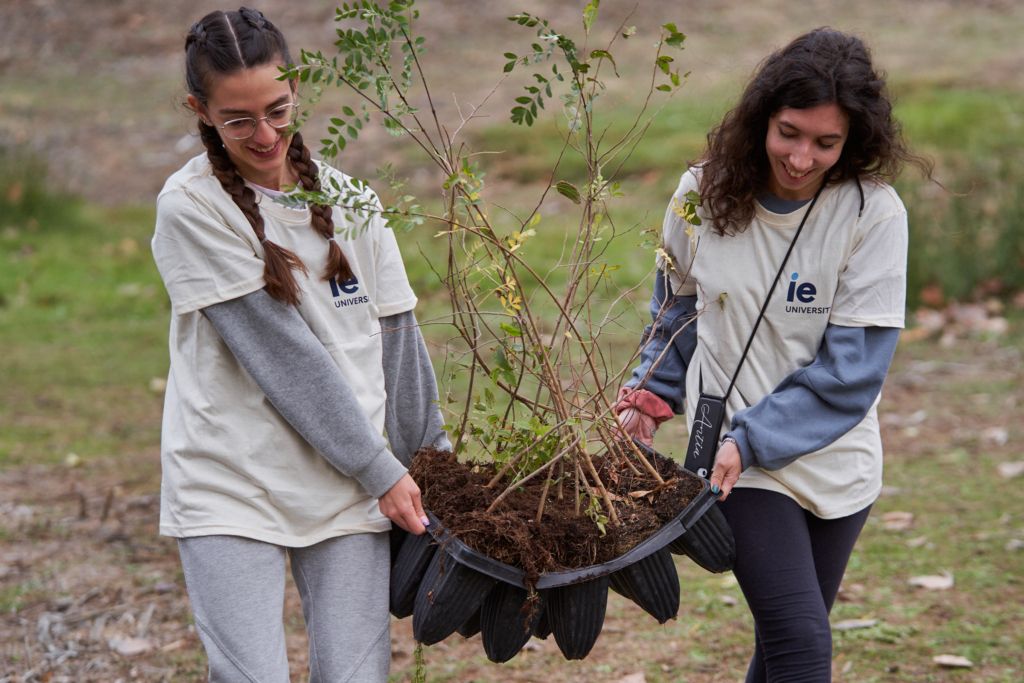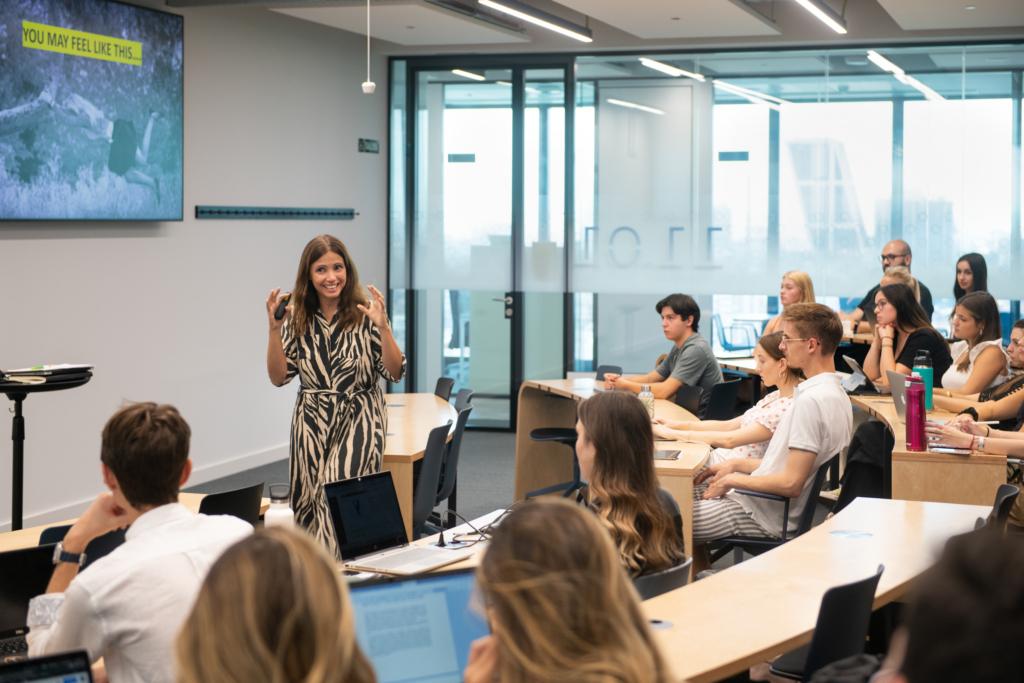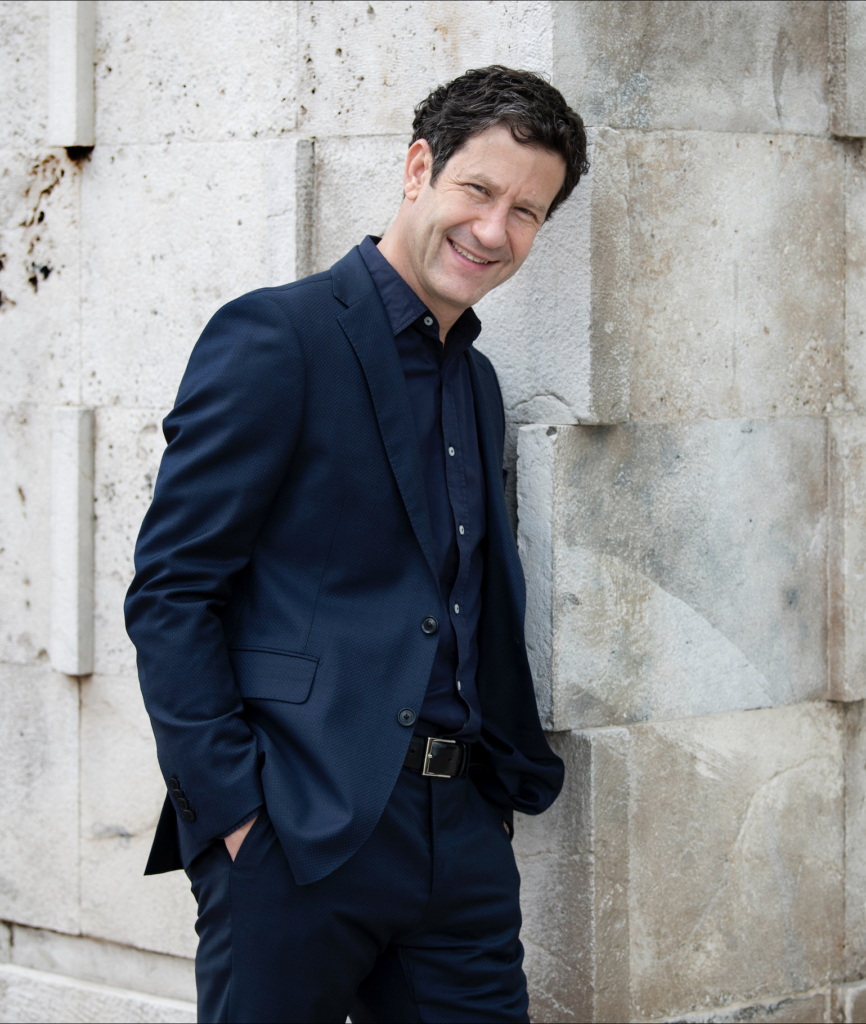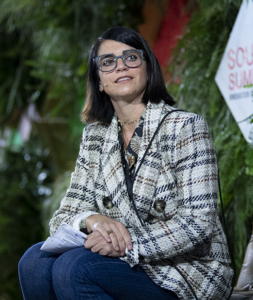
IE University students work on a reforestation project run by the university’s Sustainability Office. Courtesy photo
Recently, Lee Newman found himself needing to make a note. He didn’t have his phone or any other electronic device on him, so he decided to go old school: He asked for a pen and paper.
One problem: As part of IE University’s move to cut its carbon footprint, most paper printers had been removed from offices, and staff transitioned to electronic communication. It was a scramble to find Newman a single sheet of paper.
“I said to somebody, this is the first time I’ve written on a piece of paper in two years. Honestly,” says Newman, dean of IE Business School since 2021.
In February, IE University in Spain was recognized as one of the first carbon-neutral universities in Europe. It reduced its scope 1 and 2 CO2 equivalent emissions by 50% through a mix larger institutional initiatives and combined efforts of individual staff, faculty, and its more than 8,000 students. Things like remotely shutting down computers at 10 p.m., training people to turn off machines and equipment when not in use, switching servers to the cloud, and only buying Amazon Web Services which uses 100% renewable energy. And eliminating the use of pen and paper as much as possible.
“We talk about being part of the chain of change, and everybody’s part of it in our community. We have to walk our own talk,” Newman tells Poets&Quants. “It’s kind of like when the Kindle came out and everybody said, ‘No, I want my books. I want paper.’ Within a year, many of those people were on the Kindle and never went back to paper. You just have to push people sometimes.”
IE’s COMMITMENT TO SUSTAINABILITY
In response to unprecedented environmental and social challenges around the world – and business’ growing role in meeting those challenges – sustainability is fast moving from buzzword status in business education to a feature. Sustainability courses, curriculum upgrades, and initiatives have exploded at institutions big and small.
IE Business School in Spain, along with its parent university, has been a leader in the space for years.
This year, the Financial Times MBA Ranking put IE Business School No. 1 in the world in ESG and Net Zero Teaching and second in the world for its carbon footprint. IE is one of eight top European b-schools that have partnered together to accelerate the business response to the climate crisis. Their group, Business Schools for Climate Leadership, just held its first in-person conference at IESE Business School in Barcelona, Spain.
Poets&Quants recently sat down with Newman and Isabela del Alcázar, Global Head of Sustainability of IE University, to talk about the business school’s impressive sustainability track record.
Newman is an American expatriate who earned his MBA at MIT Sloan, worked for McKinsey & Co., and was the founding dean of IE’s School of Human Sciences and Technology. Alcázar oversees the university’s sustainability efforts through its 10 Year Challenge Campaign, launched in January 2020, to make IE a leading institution in sustainability and to reduce greenhouse gas emissions to zero by 2030.
Our conversation, presented below, has been edited for length and clarity.

A class meeting in IE Tower, the university’s technological and sustainable campus in Madrid, which opened in 2021. Courtesy photo
Is IE’s sustainability focus strategic, or did it grow more organically?
Isabela del Alcázar: Both answers could be true. Throughout the years, sustainability has had different names, and therefore we have a long history of sustainability in its other names.
In 2019, we decided that we had to aggregate everything into one unit, which is basically a data center where we collaborate with different departments to pursue and to promote sustainability throughout the university.
Lee Newman: When I arrived at the business school, my mandate was innovation and thinking about what’s next for business education. We’re quite concerned with the opportunities for us, and how we are going to rethink what education will be in the future.
Part of my initial mission was to determine where we need to be 10 years out, and I think we all pretty much agree that knowledge and content is not the source of value in education anymore. I mean, knowledge in the service of skills starts to get interesting. But we go even further. We’re very career focused, but our definition of education for the future is fundamentally about transformation. That sounds simple, but it leads to different conclusions about what you do with students and what it was learning for.
What we have built this version of the business school around is this concept we call “The Next Best You.” It’s our mission as a school, our promise to students and alumni. It is about helping students understand who their current you is when they join us – their strengths, their little pesky gaps that we all have, their dreams. Then it’s helping them figure out where they want to be.

Lee Newman, dean of IE Business School
The link to sustainability has three components: Your career, your impact, and your purpose. Your career has a huge discovery component because you can’t transform into who you are and where you want to go. So there’s a big Career Discovery piece there that is quite innovative.
Impact is about the skills you need to make things happen in the real workplace, which is not actually what many schools focus on teaching. We did some data analysis, and of top 40 business schools, us included, nobody’s teaching most of those skills that companies want. For example, project management is not a required course at any of the top 40 business schools.
The third piece is your purpose. The idea is we want to create a new generation of business professionals who are successful by their own definition and responsible – and it’s an “and” for us, and it should be for them.
We define purpose at three levels: Planet, where we get into climate change and sustainability from a green standpoint, etc. Society – social innovation, social entrepreneurship, and how can we as business people use our skills to add to our communitie? And the third level, the workplace, is most important to me because I teach leadership and behavior. How can we as a community of new world business professionals create environments in our workplaces that are great. There we talk about diversity, equity, inclusion, and belonging (DEIB); we talk about wellbeing; and we talk about positive leadership. All of those touch directly with sustainability.
What are some of the specific ways students engage with sustainability at IE Business School?
Newman: Within the business school, we think of landing sustainability at three levels: The first we call the DNA level, things you have to do: obligatory experiences in the school to at least plant the seed to being a responsible business professional.
For example, for undergraduates, we have probably close to 4,000 BBAs at this point. They, along with all students at the university, are required to take IE Impact, a set of courses that combines humanities, technology and entrepreneurial mindset. Then they must do a project that focuses on something that has a broadly defined sustainability impact.
The second level is the booster level: Options you can pursue as part of your bachelor’s degree, master’s, MBA, Executive MBA, etc.
The third level, and the strongest, is we give you opportunities to bet your next career steps on sustainability.
At the DNA level, how is sustainability content embedded into core courses? Or is the content available more as electives?
Newman: Our philosophy is two pronged. One, we think you should have courses, certificates and other things that allow you to actually focus on sustainability, but that’s not enough. So, the second part is sort of like with digital; it’s hard to study any business function without having a digital component. We think the same thing for sustainability. So whether we’re talking about people sustainability, talent development in HR, or product sustainability and marketing, you can’t teach the course without that content.

Isabela del Alcázar, Global Head of Sustainability of IE University
Alcázar: How our faculty works inside IE is we have a single faculty divided into chairs by areas. We decided that sustainability had to be everyone’s ownership. So the chairs push sustainability throughout the different programs.
For example, in strategy, initially we only had a couple of champions. Right now, there’s a transition and more and more professors are willing to introduce this content. They see that as something that is required by the job market that students need to know. And really, they’re pushing it really hard, and that’s how it permeates into every program.
Newman: Fun little story: One of our fantastic professors, Mikko Ketokivi, teaches operations which, traditionally, is very hardcore analytical. In the business school, we work in teams; a huge percentage of the MBA, and all of our programs, work in teams. So, for their final team project, Mikko told me that eight out of eight teams in his section showed sustainability related or social impact projects. In an operations class. We’re talking about sustainable supply, sustainable materials, circular economy, etc. That says a lot.
When I arrived at the business school, hearing these stories from alumni and student candidates, talking constantly about purpose, this is what it is. This is what they want to do. This is the new world of business.
Yes, it seems like the push for sustainability content in business schools isn’t just market driven, but very much student driven as well. Have you noticed a difference in students in the last decade or so and how they engage with sustainability?
Newman: I teach what we might call soft skills. (I hate that term, because they’re the hardest to teach and to learn.) But, when I arrived at IE 13 years ago, talking about positive emotions in the workplace was a tough sell. Now, that’s an easy sell. Everybody wants to talk about wellbeing. Everyone wants to talk about work life balance.
People are very interested, at least in our context, in understanding how to better work together. An IE team is a very, very turbulent experience, in both the positive and negative sense. I mean, you have teams with an Israeli and a Saudi, or with someone from Ukraine and someone from Russia, and they have to pull it off. Those are the extreme examples, but you’ve got people who think “on time to a meeting” is 20 minutes late and people who say five minutes early is on time.
We see a huge rise in the interest in linking business to impact at those three levels: planet, society and workplace. Even students who know that they’re going to be recruiting with a consulting firm or a bank – and maybe they should be spending more time on honing the exact skills they’re going to need for Goldman or McKinsey – actually say that they want to focus on planting those sustainability seeds while in business school.
I think this is one of the super positives from these generations. I was from the “me, greed” generation of the 80s. On Wall Street, you know what that looks like. That’s just changed. And so we have to honor that and rethink education to build around that.
Alcázar: To add to what we just said, for example, from our transversal perspective, we have pro bono lab hours for undergrads which students can dedicate to sustainability projects. The number of students participating in these has increased at 25% from one year to another, so they’re really looking forward to opening their learnings and new experiences. We also have eight student clubs related to sustainability, and we do see a rise in participation there as well.
Newman: Just another example, we have about 400 students in business masters degrees focused on marketing, communication, branding, and talent development. All 400 have to take a DEI based team management course. So, when we say DNA, I mean, it’s real.

A class in IE Tower. The Tower, which can accommodate 6,000 students, was designed to minimize environmental impact. It has the LEED Gold Certification for sustainability. Courtesy photo
And what opportunities are there for students to engage at the booster level?
Newman: In terms of the booster level, as Isabela said, there’s the curricular and extracurricular activities as well as certificates that you add on to your program. One of the first ones was actually a certificate in sustainability, both at the bachelor level and one at the masters level.
These are beefy. At the masters level we have nine ECTS (European Credit Transfer and Accumulation System), which translates to four or five courses in the U.S. At the Bachelor level, it’s 15 ECTS. To give you a sense of the interest, in that group of 400 or so of non-tech business masters students, 25% of them chose to do the sustainability certificate on top of what is a very intense one-year master’s workload. So one in four of these students, which is incredible.
Another example, we have a program called Financiers Without Frontiers available for our masters of finance students. They have an option of going to Ghana to do a microfinance project, but we only have 20 slots. It’s just completely oversubscribed every year, so we’re trying to think about how to scale it. It shows again, to your question, how things are changing. I mean, these are masters in finance students; they want to go work, in theory, in banking. But then they come back saying that impact investing sounds really cool. And sustainable finance is starting to sound really interesting and maybe the old school, sleep under your desk investment banking job is actually not for me.
There are a lot of examples, but maybe one that’s a little bit different is the level of executive MBAs. We have a new executive MBA in leadership, that’s kind of heavy on leadership and less on kind of MBA stuff because these are very senior people. They are required as part of this program to go through a board readiness training and a big chunk involves ESG and DEIB as key topics. They also have a core course in DEIB. So, they have to deal with difficult situations with each other, and they learn to be leaders in modern, progressive workplaces.
When was that program launched?
Newman: We just opened it a month ago. We’ve always had an executive MBA, but my mandate for the business school was innovation. So we are going through every program in the school and thinking about what education for the future needs to look like.
And finally, tell me about sustainability engagement at the career level.
Newman: We have now in all our general management programs – which is Bachelor in Business Administration, Master’s in Management, and MBA – a concentration in sustainability management and strategy. That’s where you bet your next career steps on this world of sustainability. We’ve been doing some research, and we know the job market in this field, in consulting in particular, is enormous. It’s big in energy transition, and basically any company that has to go through a business model transformation needs sustainability people. So we have these concentrations to target those jobs.
I can’t say too much about it yet, but we have in the oven a Master’s in Sustainability and Business Transformation, which is going to come in fall of 2024.
Alcázar: I would add that students are already exposed naturally through the core to this type of content. The maturity of the job market is right now exploding. Two years ago, there were very few job offers in sustainability. Now, 10% of jobs that are offered require sustainability skills.
Tell me about the journey to becoming the first European business school to become carbon neutral.
Alcázar: Back in 2019, we decided to follow a OKR structure (Objectives and Key Results.) Part of the objective was reducing our environmental footprint. Throughout the organization, we gave out certain KPIs (Key Performance Indicators). On the energy side, these were on efficiency, reduction, and also investments.
Of course, we’ve been growing a lot because three years ago, we didn’t have the tower. (See: IE Opens Its United Nations For Higher Education In Madrid.)
All of the data that we share publicly on our website, is normalized per square meter. Throughout the last three years, we’ve increased efficiency 33% per square meter. At the same time, we’ve changed our energy mix. Last year, 74% of our energy was renewable, this year it is 100%.
There were still some missing emissions that we couldn’t reduce. Last year, we audited our carbon footprint, and we still had 1,600 tonnes of equivalent CO2. So we made the investment to neutralize our carbon footprint. At some point, we will be able to reduce even further, and that’s our goal.
What about travel? Experiential learning is so important for business students.
Alcázar: Scope 3, it’s so difficult to measure. Obviously in 2020, travel was zero. That was kind of easy. But it’s very difficult for us not to travel. Our students come from 140 countries, and that has an impact.
That’s also why we believe that neutralizing or doing counter-effective measures are good, but the best would be to find solutions for traveling with no emissions. We have reduced the maximum business travel we use, we connect more through technology, but there’s some traveling that we cannot avoid.
Newman: On the student side, it’s tricky because, I mean, there’s things that you may have heard of called the rankings. Some of the rankings focus on things like how many of your students spend more than a month abroad? How many do international immersions?
On the one hand, we believe in those experiences. When you think about where education is going, where’s the value of higher education in the future when content is more of a commodity etc, part of it is actually those kinds of experiences. So, we want to do more of that.
But, on the other hand, what’s the message with respect to sustainability? I think, like anything, there has to be a balance.
Alcázar: We’re betting a lot also, which I think will help eventually, on VR and technology to take us to live other experiences. Really immersive learning, I do think there’s a future there, and we’re pushing that hard. This year, we had a VR case on climate change. And, your legs shake once you get out of the VR tornado.
It’s not an alternative to traveling, but it does help.
Anything else you’d like to add about IE’s sustainability efforts?
Newman: IE also has a variety of centers of excellence. We have a Social Innovation and Sustainability Center and a center that does research on boards and key sustainability topics. We have an observatory that focuses on consumer trends and sustainability. We just instituted a faculty chair on impact investing to look at anti greenwashing type metrics.
We have many professors researching these topics as well. We’re thinking about whether sustainability should be a faculty area or whether just every area of faculty should just be doing research in their own area. The research, the knowledge generation part of, is very important as well.
It’s an exciting time. I always say to our students that I came through business school 31 years ago as part of the “me, greed” generation, and we just didn’t think about any of these issues. It wasn’t that we were bad people, but these things were not on our agenda.
My favorite part about my job now is the idea that maybe I, as a dean, can leave a legacy of helping create a business school that really focuses on developing this new mindset of the next generation of business professionals: Ones who are responsible and feel that responsibility at the three levels: Planet, society, and workplace. The world seems to see business as part of the solution, which I think is really a change.
Don’t Miss: Eight Elite European B-Schools, One Mission: Fighting Climate Change and Calling All ‘Ecopreneurs’: Stanford GSB’s Big Move In Ventures That Combat Climate Change











Questions about this article? Email us or leave a comment below.